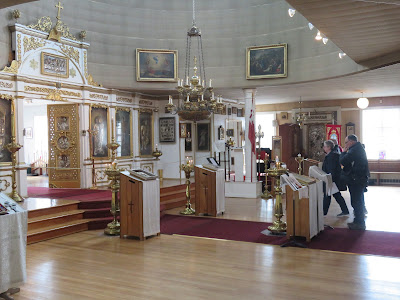·
Fish Ladder, where salmon struggle back to their
native stream bed, fighting lower falls and then using a concrete fish ladder
to avoid the roughest white water;
·
Tongass Historical Museum, containing artefacts,
texts and photos from the history of this salmon-canning capital and timber
town. Much of what we saw reminded us of the south-west of Tasmania;
·
Creek Street, a former red-light district from
1902 with working girls and dance halls, now filled with trendy art and craft
shops.
No, Jim hasn't changed...
Tall Tales Taxidermy shop: the taxidermist shop owner
has been in the business for 53 years
Fish Ladder
Historic Creek Street
Tongass Historical Museum
Next stop was the small town of Sitka where, on Castle Hill, the Russians erected Baranof’s Castle in 1837. Then on 18 October 1867 it was the site of the transfer of Alaska from Russia to the United States. Keeping the Russian theme throughout the town is the wooden Saint Michaels’ Cathedral, a relatively small building that holds an important collection of Russian Orthodox art and treasures. Built in 1844-48 it is still in use today.
In Sitka we took a shore excursion firstly to the National Historical Totem Park which preserves and interprets the site of a Tlingit Indian Fort and their battle with the Russians in 1804. There we took a fabulous walk along the river through the greenest temperate rainforest. From there we drove to the Alaska Raptor Center, whose goal is to release all rehabilitated birds into the wild. We saw several Bald Eagles, falcons, ravens and owls, up close, and were advised not to wander too far for fear of bears…
And bears we saw, but not in the wild. These bears, both
black and brown, are residents of Fortress of the Bear, a safe haven for
orphaned bear cubs who are brought back to full health and provided with a long
life in a safe enclosure that was once a pulp mill.
St Michael's Cathedral
National Historical Totem Park
Alaska Raptor Centre
Bald Eagles waiting for the feeding of the bears

Fortress of the Bears
Then it was on to Icy
Strait Point, near the small town of Hoonah. The history of the region goes
back to the mid-1700s when the Tlingit people settled in the vicinity. In 1912
the Hoonah Packing Company built a salmon cannery at what is now Icy Strait
Point. Today it is a museum that tells the fascinating story of salmon canning
through the ages. Whilst here we saw a pod of humpback whales frolicking in the
sea and learned about Skunk Cabbage, a yellow flowering plant, whose leaves
give off a ‘skunky’ smell when crushed. However, it is a staple food for the
local bears who eat it to aid their digestion.
The Cannery Museum
Hoonah
From small to large, Alaska’s capital Juneau has a population of 32,000. It is most famous for the
Mendenhall Glacier. We took a shuttle out from the city and saw our very first
glacier – a truly inspiring sight. It once covered the entire valley but has
receded a great deal during the past decades and small icebergs dot the
adjacent lake. The interesting visitors’ centre explains how glaciers form and
recede and displays a lot of information about local wildlife. We also saw our
first porcupine in the wild – perched high in a tree and watched nesting Arctic
Terns diving for food.
Back in Juneau we had excellent coffee at the well-known
Heritage Coffee House and wandered the historic streets filled with pubs,
galleries and souvenir and jewellery stores. Interestingly, Juneau like a
couple of other Alaskan cities, is only accessible by air and sea. The main
highway actually stops at a sign saying 'The End'!
The magnificent Mendenhall Glacier
Porcupine
Time for coffee at Heritage Coffee Shop
Juneau Main Street
Then its onwards and upwards to Skagway and the magnificent
Hubbard Glacier!

































Lots of interesting tibits of information! For having never been to Alaska, is Juneau an island of Alaska, or is it that no roadways have been made to connect Alaska to Juneau? All of this is so interesting?
ReplyDeleteOn the Historical Street Creek photo, are those actual homes or shops?
Kim